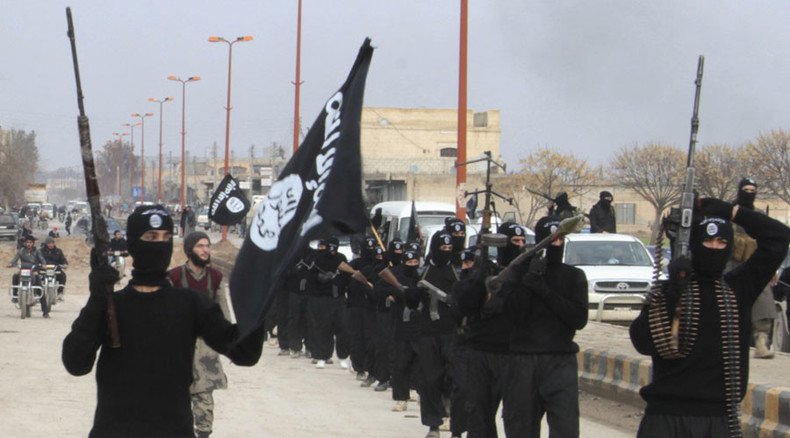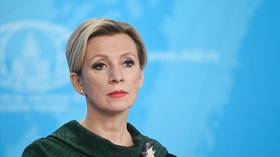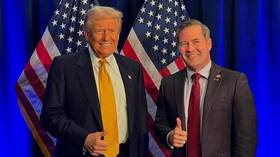‘US meddling in Mid-East led to rise of radical extremism’

The US in concert with Saudi Arabia, Qatar and Turkey supported the Arab Spring and Sunni extremists in a bid to bring ‘democracy’ to the region, Larry Johnson, a former CIA and State Department Official, told RT.
Syria became a target as a way to put pressure on Iran, he added.
The US State Department continues to blame President Bashar Assad's government for the advance of Islamic State (IS, formerly ISIS/ISIL). Meanwhile, former US intelligence Chief Michael T. Flynn admitted that American government knew its policies would lead to the rise of IS.
RT: What's your take on Flynn’s statement?
Larry Johnson: General Flynn, who was head of Defense Intelligence Agency [DIA], is right. I think he needs to phrase it in slightly different manner. The US in concert with Saudi Arabia, Qatar and Turkey made a conscious decision to support the Arab Spring and in that to support Sunni extremists in a bid to bring ‘democracy’ to the region. Saudi Arabia and Turkey were particularly insistent upon doing something about Iran, because Iran’s influence has spread. The target became Syria as, if you will, an indirect way to put pressure on Iran. So the US became actively involved starting in March 2012 with helping move weapons from Benghazi, Libya, into Syria through Turkey. It was that effort that was beginning to favor ISIL/ISIS because they became stronger.
And it was along about in August in this intelligence report. You have to understand, that is actually an intelligence report that was generated either by the Israelis, or the Brits, maybe the Germans - it’s somebody not in this country [the US], but it was reported in by a defense intelligence agency officer - sent it back to the US, which every one of those countries did the analysis they were very prescient, very accurate, because what they identified as “would take place” - in fact did.
READ MORE: US ex-intelligence chief on ISIS rise: It was 'a willful Washington decision'
And so what we’re looking at is the US was complicit in helping ISIL/ISIL/Daesh - whatever you want to call them - come to power. And it has been the US meddling in the Middle East which has led to this raise and radical extremism. Worth noting that in the last two years, according to the State Department’s own reports, the level of international terrorism has doubled, the number of fatalities from international terrorism has tripled. And this is in the wake of promises from Barack Obama who claimed that Osama Bin Laden is dead and Al-Qaeda is on the run. Well, the radical Islamic extremists are not on the run, they are very much on the offensive.
Given the history of the US and Russia, particularly the US backing the Mujahideen in Afghanistan, I wouldn’t blame President [Vladimir] Putin and Russian generals to sit back and admire and hackle the hypocrisy of the US in this, cause it really is just disgusting.
RT: Why won't the US government accept the evidence it’s given by intelligence officers?
LJ: The politicians will deny that the sun rises in the east. This has been a traditional problem that intelligence has. This is information that came into the US government and was presented to DIA; and DIA reported it forward to the policy makers; and policy makers chose just to ignore it, because it did not agree with what they believe. They could conveniently close their eyes, shut their ears, and pretend that it didn’t exist, which is exactly what happened. Even though, as we see in black and white, there is no deny that that information, that cable - that’s called a cable, it was generated in the Department of Defense - and you can tell that it came formally into all aspects of the US government, both [sic] military, Central Intelligence Agency [CIA], State department, FBI, Homeland Security… everybody had it. We’ve the appropriate clearances for it, and that includes people at the White House.

‘US focused on toppling Assad – regardless of consequences’
Said Arikat, Washington bureau chief for the Palestinian Al-Quds newspaper, says it’s unwise for the US to support the militant opposition in Syria and warns that it’s very difficult now to contain the situation there.
RT: A former American intelligence chief says the US government knew its policies would lead to the rise of Islamic State (formerly ISIS/ISIL). What's your take on that?
Said Arikat: I spent many years in Iraq as a UN official and I’m quite familiar with this process. My take on this is that I’m not surprised. What Michael Flynn said, what he exposed basically, is very well known because the US has always relied on these elements. It’s always looking at the short-term, so to speak, what we can do next and so on, and this process creates this monster. That’s how al-Qaeda morphed to begin with, as we heard from what [former] Secretary of State Hillary Clinton said, that’s how the spokesman [on Monday] responded to Gayane, your correspondent. I’m not surprised. It is done willfully because as we were told time and time again – I go to the State Department as well, every day – we are told that the reason there is IS is because Assad acts like a magnet, because the US with its allies in the Gulf region – Saudi Arabia and other Gulf members – are focused on toppling the Assad regime regardless of the consequences. So one is not surprised by these revelations.
RT: As you've attended daily briefings at the State Department, how do you think they've handled questions on this subject?
SA: Miserably. I go daily and I’ve asked these questions earlier on and in fact we posed the question: “Is it wise to support the militant opposition of so many different groups? Many of them are really Islamist and Salafist. Is it wise to support them with arms and facilitate them or allow your allies to do the same thing?” and consistently they said that they are focused on toppling Assad because he has lost his legitimacy to rule and so on. This is definitely unwise and I think now this is very difficult to contain the situation in Syria or in Iraq. It’s very difficult to put that genie back in the bottle. The US – if it really is intent on defeating IS – it has to create or it has to facilitate conditions by which or through which you can have a political resolution, and you begin by saying: “We want all Syrian representatives in these talks, including those who look at Bashar Assad as their representative.” That’s the only way. To continue to adhere to this stubborn line that Assad has lost his legitimacy and has no future and Syria’s future and so on is basically you are just egging on or agitating for more of these groups to emerge and morph into something else. Today we have IS, tomorrow we might have something else.
RT: Can you see the State Department ever changing its stance on this, though?
SA: One would hope that they learn from past mistakes. The fact that some are willing to come out and admit the past mistakes and say, “We aren’t going to repeat the disaster we committed in Iraq, for instance. We are learning from that lesson and not doing the same thing in Iran.” I think there are some good things that could come out there, but I don’t really see this presidential administration moving away from this line unless it can work very faithfully with other components of the international community – with the Russians, the Iranians and other - to really bring an end to this bloodshed that we witness day in and day out in Syria.
The statements, views and opinions expressed in this column are solely those of the author and do not necessarily represent those of RT.
LISTEN MORE:
The statements, views and opinions expressed in this column are solely those of the author and do not necessarily represent those of RT.












